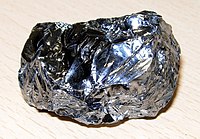
Photo from wikipedia
Drought and salinity stress severely inhibits the growth and productivity of crop plants by limiting their physiological processes. Silicon (Si) supplementation is considerd as one of the promising approaches to… Click to show full abstract
Drought and salinity stress severely inhibits the growth and productivity of crop plants by limiting their physiological processes. Silicon (Si) supplementation is considerd as one of the promising approaches to alleviate abiotic stresses such as drought and salinity. In the present study, a field experiment was conducted over two successive growth seasons (2019-20) to investigate the effect of foliar application of Si at two concentrations (1 and 2 kg Si ha-1) on the growth, yield and physiological parameters of three maize cultivars (ES81, ES83, and ES90) under three levels of irrigation salinity) [1000 (WS1), 2000 (WS2) and 3000 (WS3) mg L-1NaCl]. In this study, A trickle irrigation system was used. Si application significantly mitigated the harsh effects of salinity on growth and yield components of maize, which increased at all concentrations of Si. In irrigation with S3 salinity treatment, grain yield was decreased by 32.53%, however, this reduction was alleviated (36.19%) with the exogenous foliar application of Si at 2 kg Si ha-1. At salinity levels, Si application significantly increased maize grain yield (t ha-1) to its maximum level under WS of 1000 mg L-1, and its minimum level (Add value) under WS of 3000 mg L-1. Accordingly, the highest grain yield increased under Si application of 2 kg Si ha-1, regardless of salinity level and the cultivar ES81 achieved the highest level of tolerance against water salinity treatments. In conclusion, Application of Si at 2 kg Si ha-1 as foliar treatment worked best as a supplement for alleviating the adverse impacts of irrigation water salinity on the growth, physiological and yield parameters of maize.
Journal Title: Frontiers in Plant Science
Year Published: 2022
Link to full text (if available)
Share on Social Media: Sign Up to like & get
recommendations!